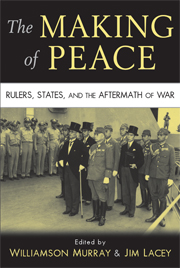Book contents
- Frontmatter
- Contents
- Preface: concluding peace
- 1 Introduction: searching for peace
- 2 The Peace of Nicias
- 3 “A swift and sure peace”: the Congress of Westphalia 1643–1648
- 4 The Peace of Paris, 1763
- 5 In search of military repose: the Congress of Vienna and the making of peace
- 6 War and peace in the post–Civil War South
- 7 Vae victoribus: Bismarck's quest for peace in the Franco-Prussian War, 1870–1871
- 8 Versailles: the peace without a chance
- 9 “Building buffers and filling vacuums”: Great Britain and the Middle East, 1914–1922
- 10 Mission improbable, fear, culture, and interest: peace making, 1943–1949
- 11 The economic making of peace
- 12 Ending the Cold War
- 13 Conclusion: history and the making of peace
- Index
- References
2 - The Peace of Nicias
Published online by Cambridge University Press: 05 June 2012
- Frontmatter
- Contents
- Preface: concluding peace
- 1 Introduction: searching for peace
- 2 The Peace of Nicias
- 3 “A swift and sure peace”: the Congress of Westphalia 1643–1648
- 4 The Peace of Paris, 1763
- 5 In search of military repose: the Congress of Vienna and the making of peace
- 6 War and peace in the post–Civil War South
- 7 Vae victoribus: Bismarck's quest for peace in the Franco-Prussian War, 1870–1871
- 8 Versailles: the peace without a chance
- 9 “Building buffers and filling vacuums”: Great Britain and the Middle East, 1914–1922
- 10 Mission improbable, fear, culture, and interest: peace making, 1943–1949
- 11 The economic making of peace
- 12 Ending the Cold War
- 13 Conclusion: history and the making of peace
- Index
- References
Summary
It is much easier to start a war than to end one. The former, a single, willful party can ordinarily accomplish with ease; to achieve the latter, it usually takes two. Often, it takes more parties than that. Such was the experience of those who found themselves engaged in what is conventionally called the Archidamian War – the first stage in what Thucydides termed “the great war” that took place “between the Athenians and the Peloponnesians” (Thuc. 1.1).
The Archidamian War began in the spring of 431 B.C. It ended, if that is the proper word, ten years thereafter in the spring of 421 B.C., when ambassadors from Athens and Sparta met to swear an oath on behalf of their rival cities that for fifty years they would honor the terms of what came to be called the Peace of Nicias (5.17-20). The fact that the Athenians and the Spartans set a term to the agreement, that they regarded it as a long-term truce and never even imagined that it would be a lasting peace, should occasion on our part a brief digression. Peace making in antiquity was not the pious process that it pretends to be today.
With regard to war and peace, the ancient Greeks entertained few of the illusions that govern twenty-first–century rhetoric and shape policy making as well.
- Type
- Chapter
- Information
- The Making of PeaceRulers, States, and the Aftermath of War, pp. 30 - 69Publisher: Cambridge University PressPrint publication year: 2008



